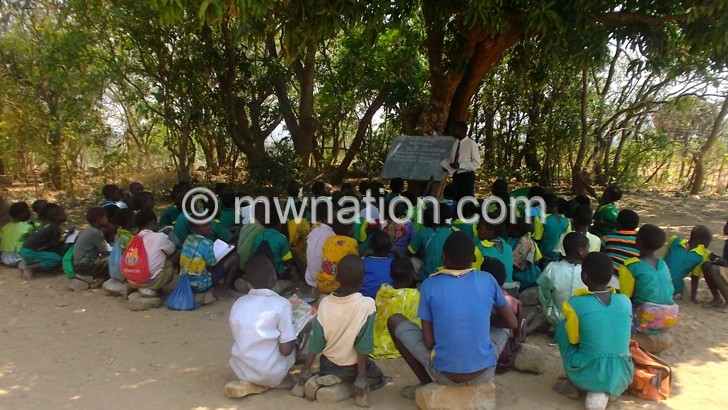What’s in a mother tongue?
She has just scribbled ‘1 + 1 =…’ on the chalkboard. She then turns to face the 122 Standard One pupils sitting under a tree. This is a class at Chaone Primary School in Machinga District.
“Do we all understand that?” she asks the class in English.

Silence.
She asks again, this time even louder than before.
More silence.
She, then asks in Chichewa.
“Tonse tamva zomwe zalembedwa pa bolodipo?”
There are some hands raised.
“Yes, Ajibu,” says the teacher.
And Ajibu answers in Chichewa of Chiyao dialect: “Amenewo ndi masamu madamu.” And he sits.
The other, with a raised hand, also stands and, like Ajibu, answers in Chichewa: “Mwalemba wani pulasi wani”.
Then the teacher clears her throat. Speaking slowly, she loudly, in Chichewa, explains that: “Apopo ndikutanthauza kuti kutenga mwala umodzi ndikuphatikizapo wina, pakhala miyala ingati?”
The pupils begin to work with their stones in their hands and soon, three-quarters of their hands are seen flapping in the air. Some even raised both their hands to be noticed quickly.
The teacher, Elufe Chigalu, tells me after the class that despite government policy advancing that pupils learn in English, it is difficult for the pupils to grasp the lesson in English. The 2013 Education Act provides for ‘English only’ policy.
Often, if not always, she says, she uses Chichewa, and sometimes even Chiyao, to ensure effective learning.
“Otherwise, if you maintain English, you will end up teaching not achieving anything,” she says.
What Chigalu says resurrects the age old debate regarding the importance of using mother tongue as a medium of instruction in young learners.
Chancellor College professor of African Languages and Linguistics, Pascal Kishindo, says the issue of language is central to what goes on in any education system.
“Learning in a foreign language disadvantages our children immensely. They have to fight a war on two fronts, to use a metaphor: first they have to learn and “master” the language of instruction, and second: they have to understand the subject content. It is not easy for most pupils. The end result is high dropout levels and poor performance. All these negative impacts are well documented in the literature,” he says.
A recent policy paper by Unesco’s Global Education Monitoring Report (GEM Report) indicates that 40 percent of children do not access education in a language they understand.
The policy paper, ‘If you don’t understand, how can you learn?’ released for International Mother Language Day on February 21, argues that being taught in a language other than their own can negatively impact children’s learning, especially for those living in poverty.
The report also emphasises that learning improves in countries that have invested in bilingual programmes.
“In Guatemala, students in bilingual schools have lower repetition and dropout rates. They also have higher scores in all subject areas. Children in Ethiopia who participated in bilingual programmes for eight years improved their learning in subjects across the curriculum,” it reads.
In Malawi, the question of using mother tongues in education has been a topic of debate for years. The question, often, has been: How feasible is it for Malawi, a country with so many ethnic languages, to have mother tongues in its education?
Kishindo says it should be clear by now that the mother tongue is not necessarily about membership of a given ethnic group.
Neither, adds Kishindo, is it about the language your mother speaks.
“It is about the language(s) that the children learn and use for his or her daily needs in his/her early years of development. It is the language or languages that one learns from birth or before the on-set of adolescence.
“A man and a woman may marry and never use the language associated with either of their ethnic group. Therefore, their off-spring cannot learn either their father’s or mother’s language. The majority of Ngoni either speak Chichewa (Central Malawi) or Chitumbuka (Northern Malawi); these are their mother tongue,” he explains.
Kishindo warns against the tendency by some to exaggerate the multiplicity of languages in Malawi as a challenge for mother tongue education.
“Some of the languages are extinct: Singoni and Elhomwe, for example, in their current state cannot be used as languages of instruction. They need to be revitalised first. Some languages are not spoken beyond their village of borders,” he explains.
He adds that the reality in Malawi is that there are only three main languages which are used as lingua franca: Chichewa, Chitumbuka and Chiyawo. It is feasible to have these three languages as a starting point for mother tongue education, he says.
Kishindo, hence, challenges that it is possible for Malawi to have mother tongue education if it is understood the way educationists understand it and not the way it is deliberately misunderstood by its detractors.
“What we need is political will which is not there at the moment. While as a country we may be comfortable with our do-nothing attitude, we must realise that no country has ever developed on the basis of a foreign language, a language mastered only by a small elite.
“It is perhaps not surprising that Malawi in particular and African countries in general are bottom of the pile in terms of Human Development Indicators [HDI],” he says.
However, spokesperson for the Ministry of Education, Science and Technology, Rebecca Phwitiko, told The Nation that contrary to some research findings that learning in the mother tongue in the early years of primary school improves learning outcomes, the ministry noted that learning in Chichewa in the early years of primary school has not done much for the country’s education system.
“The repetition rate is still high and generally, pupils struggle to transition into higher primary school where the language of instruction is English. This also affects the learning process. And even beyond that, we have students coming out of secondary school who struggle to express themselves competently in English, which is the official language,” Phwitiko said.
She underlined that the Education Act (2013) prescribes English as the language of instruction at all levels of our education system and that the ministry is complying with the law by putting this in practice.





